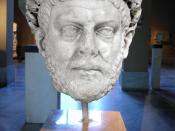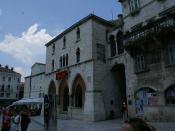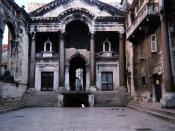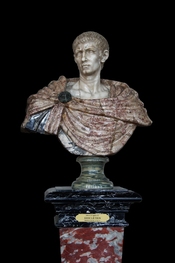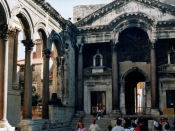The Reign of Diocletian Diocletian was born by the name of Diocles at Salona in 245. His parents were freed Dalmatian slaves in Illyricum, which today would be known as Yugoslavia. Diocletian comes from a very meek background. He was married to his wife Prisca and had one daughter named Valeria. (p.451) One of his main accomplishments is that he set a path for a renewed Roman Empire, this was referred to as the "Later Roman Empire or the Byzantine Empire." Diocletian easternized Rome. He took in the ceremonies of the east and implemented them into what we know as the Byzantine Empire. Diocletian was very active in military duties. By being in the military he learned exceptional organization and leadership skills. He fought in the Persian War under Carus. Carus died mysteriously and his son Numerian took over his position. Diocletian then took the position of Carus' son's bodyguard.
Soon after that Numerian was murdered and the whole army was in Diocletian's hands. This marked the beginning of the reign of Diocletian. (pgs. 453,454) Diocletian came to power in 284. When he arrived as emperor, Rome was falling apart. Soon Diocletian realized that his Empire was too large for him to rule by himself. In seeing this, he split his empire up into two parts: in the west was the military sector and then in the eastern half was the civilian administrative commands. Diocletian then appointed trusted friends and colleagues to help him rule.(pgs. 258-259) After a year as emperor Diocletian elected Maximian, as co-emperor, to take over the western military section of his empire. Because Maximian had no real political background he left most of the major decision making to Diocletian. After nine years, in 292, they appointed two more men as Caesars. Maximian selected Constantine because of his great military background. Constantine was also the son-in-law of Maximian. He helped rule in the west with the military. The other man Galerius assisted Diocletian in the east with administrative duties. Galerius was the son-in-law of Diocletian. (Pgs.258-259, Pg. 451) With two Augusti and two Caesars, the empire had four rulers which began the tetrarchy. Having so many people ruling over one land, there was no definite division of the empire. Maximian generally ruled Italy from Milan and Constantine ruled Britain, the situation was not so clear in the east. Sometimes Diocletian was in the east and Galerius on the Danube. In having all of these men on every side of the empire it lessened the probability of a rebellion from any of the civilians. All of the emperors acted in each other's names and issued joint decrees. In effect, there was a team of four men acting as one emperor and divided the responsibilities between each man. Although this was the case, Diocletian was clearly the main ruler, and the others bowed to his authority. (pgs. 376, 377, 378) In addition to the problem of his empire being too large to rule by himself, he also had the problem of a poor economy. Diocletian tried to reissue a new currency of gold and silver but failed because his sources of those metals were not plentiful enough. Instead he created a new form or taxation. "Diocletian's attempt at reforming the currency led to speculation and price fluctuations, since experience had taught men that such. Reforms usually did not last long. Therefore, in 301 the emperor drew up a list of maximum prices, 18 copies of which were to be posted especially in his own province in the East where Roman coins were now for the first time used to displace local issues. Since his chief purpose was to ensure low prices-of labor as well as of goods--we may suspect that the current 'denarius' was somewhat overrated in terms of gold." (Pgs. 502-503) These new laws forced people such as bakery owners, farmers, and shop owners to have no flexibility in changing their choice of occupation. This was supposed to give the empire a sense of economic stability. All his hard work trying to steady the economy at the end of his reign there were complaints that "there were more tax collectors than taxpayers."(p.259) In the year of 305 Emperor Diocletian abdicated his position in the Roman Empire. He required his co-emperor Maximian to do the same.(p.260) He gave up his position as to not be forced by his subjects to do so. Diocletian retired into the city of Spalato that he had built specifically for his retirement. He spent his retirement growing cabbages, in his huge palace. In In 308 he declined an offer to continue his duties as emperor, and the aged ex-emperor died at Spalato, December 3, 316. (http://archive.ncsa.uius.edu/SDG/ Experimental/split/split1.html)
